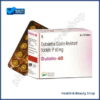If you’ve ever wondered about a medication that can address various conditions such as major depressive disorder, generalized anxiety disorder, chronic pain, and more, Duloxetine 60 mg might pique your interest. Its effectiveness in managing these conditions has been widely recognized, but what sets it apart from other medications in its class? Understanding how Duloxetine 60 mg works and its unique benefits could shed light on why it’s a go-to choice for many healthcare providers.
Why is this medication prescribed?
Duloxetine 60 mg is prescribed to treat conditions such as major depressive disorder, generalized anxiety disorder, and certain types of chronic pain. Major depressive disorder, commonly known as depression, is a serious medical illness that negatively affects how you feel, think, and act. It can lead to various emotional and physical problems and can impact your ability to carry out daily activities. Generalized anxiety disorder involves excessive, uncontrollable worry about everyday things. It can cause significant distress and interfere with your daily life. Chronic pain conditions that duloxetine can help manage include diabetic peripheral neuropathic pain, fibromyalgia, and chronic musculoskeletal pain. These conditions can be debilitating and affect your quality of life. By targeting serotonin and norepinephrine in the brain, duloxetine works to restore the balance of these chemicals, which can help alleviate symptoms associated with these disorders. It is essential to follow your healthcare provider’s instructions carefully when taking duloxetine to achieve the best possible outcomes for your specific condition.
How should this medicine be used?
When using this medication, follow the recommended dosage and administration instructions provided by your healthcare provider. Duloxetine 60 mg is typically taken once daily, with or without food. Swallow the capsule whole with water, without crushing or chewing it. It is important to take this medication at the same time each day to maintain consistent levels in your body. Do not suddenly stop taking duloxetine without consulting your healthcare provider, as this can lead to withdrawal symptoms. If you miss a dose, take it as soon as you remember unless it is close to the time of your next scheduled dose. In that case, skip the missed dose and continue with your regular dosing schedule. Do not double up on doses to make up for a missed one. Keep track of your medication usage and report any unusual side effects or concerns to your healthcare provider promptly.
Other uses for this medicine
Considering its versatility, this medication may also be utilized for managing various conditions beyond its primary indication. Duloxetine, commonly prescribed for depression and anxiety disorders, has shown effectiveness in treating chronic pain conditions such as fibromyalgia and diabetic neuropathy. Studies suggest that duloxetine’s mechanism of action in altering neurotransmitter levels in the brain can also provide relief for those suffering from chronic musculoskeletal pain.
Moreover, individuals with stress urinary incontinence may find duloxetine beneficial as it can help strengthen the muscles controlling the bladder. This off-label use has been supported by research demonstrating improvements in urinary control and a reduction in leakage episodes.
Additionally, some healthcare providers may consider prescribing duloxetine off-label to help manage migraines. While more research is needed to fully establish its efficacy in this area, preliminary findings indicate a potential benefit in reducing the frequency and intensity of migraine attacks. It is important to consult your healthcare provider before using duloxetine for any condition not specifically approved by regulatory agencies.
What special precautions should I follow?
Before starting duloxetine 60 mg, it’s crucial to check for potential drug interactions with any other medications you may be taking. Make sure to inform your healthcare provider about all the medicines, supplements, and vitamins you are currently using. This precaution can help prevent any adverse effects and guarantee the safe and effective use of duloxetine.
Check for Drug Interactions
To guarantee your safety while taking Duloxetine 60 mg, be sure to thoroughly check for any potential drug interactions. Here are some essential steps to follow:
- Consult with your healthcare provider or pharmacist before starting any new medications while on Duloxetine.
- Provide a detailed list of all prescription and over-the-counter drugs, vitamins, and supplements you are currently taking.
- Be aware of the potential interactions with medications such as MAO inhibitors, NSAIDs, or other antidepressants.
- Monitor for any signs of adverse effects or changes in the effectiveness of Duloxetine when starting or stopping other medications.
What special dietary instructions should I follow?
Make sure to follow any specific dietary instructions provided by your healthcare provider while taking Duloxetine 60 mg. Maintaining a balanced diet is essential during your treatment with this medication. It is advisable to avoid abrupt changes in your diet that could impact the effectiveness of Duloxetine. Some individuals may experience gastrointestinal side effects like nausea or upset stomach when taking this medication. To alleviate these symptoms, consider taking Duloxetine with food. Eating smaller, frequent meals throughout the day instead of large meals can also help reduce any potential stomach discomfort. Additionally, staying hydrated by drinking an adequate amount of water daily is important. Alcohol consumption should be moderated or avoided while on Duloxetine, as it may exacerbate certain side effects. Should you have any concerns or questions regarding your diet while on Duloxetine, do not hesitate to consult your healthcare provider for personalized guidance tailored to your specific needs.
What should I do if I forget a dose?
If you forget to take a dose of Duloxetine 60 mg, what steps should you take next? If you miss a dose, take it as soon as you remember. However, if it is close to the time for your next dose, skip the missed dose and continue with your regular dosing schedule. Do not take a double dose to make up for the missed one. It’s important to maintain a consistent intake schedule for this medication to guarantee its effectiveness. If you are unsure about what to do, it is recommended to consult your healthcare provider or pharmacist for guidance. They can provide you with specific advice tailored to your situation. Keeping track of your medication schedule using a pill organizer or setting reminders on your phone can help prevent missed doses in the future. Consistency in taking Duloxetine is essential for managing your condition effectively.
What side effects can this medication cause?
Duloxetine 60 mg can cause various side effects that you should be aware of. Monitoring for persistent symptoms is important as some side effects can be serious. If you experience any concerning symptoms, make sure to contact your doctor promptly.
Monitor for Persistent Symptoms
Monitoring any persistent symptoms is essential when taking Duloxetine 60 mg as various side effects may arise. Here are some common side effects to watch out for:
- Nausea and vomiting: These symptoms may occur, especially at the beginning of treatment.
- Headache: Some individuals may experience headaches as a side effect of Duloxetine.
- Fatigue: Feeling tired or experiencing a lack of energy can be a possible side effect.
- Changes in appetite: You may notice changes in your appetite, leading to weight loss or gain.
Some side effects can be serious. If you experience any of the following symptoms, call your doctor immediately:
Wondering about the serious side effects Duloxetine 60 mg can cause? If you experience any of the following symptoms, call your doctor immediately:
- Suicidal thoughts or actions: In some cases, this medication may lead to an increase in suicidal thinking, especially in young adults.
- Serotonin syndrome: Symptoms include agitation, hallucinations, fast heart rate, dizziness, flushing, nausea, or diarrhea.
- Liver problems: Look out for symptoms like itching, dark urine, yellow skin or eyes, upper right-sided abdominal tenderness, or unexplained flu-like symptoms.
- Allergic reactions: Watch for rash, itching/swelling, severe dizziness, or trouble breathing.
It’s essential to seek medical help promptly if you encounter any of these severe side effects while taking Duloxetine 60 mg.
What should I know about the storage and disposal of this medication?
When storing or disposing of duloxetine 60 mg, make sure to keep it in a cool, dry place away from moisture and heat. Store the medication at room temperature between 68-77 degrees Fahrenheit (20-25 degrees Celsius). Avoid storing it in the bathroom or near the kitchen sink to prevent exposure to moisture. Keep it tightly closed in its original container to protect it from light and humidity.
Do not flush duloxetine down the toilet or pour it into a drain unless instructed to do so. Properly discard this product when it is expired or no longer needed. Consult your pharmacist or local waste disposal company for guidelines on how to safely dispose of duloxetine. It is important to follow these instructions to prevent harm to others and the environment.
If you have any concerns or questions regarding the storage or disposal of duloxetine 60 mg, do not hesitate to reach out to your healthcare provider or pharmacist for further guidance.
In case of an emergency/overdose
If an overdose or emergency situation occurs involving duloxetine 60 mg, immediately call poison control or seek medical assistance. Overdosing on duloxetine can lead to serious symptoms such as dizziness, confusion, seizures, rapid heart rate, fainting, and difficulty breathing. It is vital to provide healthcare providers with information regarding the amount of duloxetine ingested and the time of ingestion to facilitate appropriate treatment.
In case of an overdose, avoid inducing vomiting unless instructed by healthcare professionals, as it can worsen the situation. Emergency medical personnel may administer supportive care to manage symptoms and stabilize your condition. It is important to keep the medication packaging or bottle with you to help healthcare providers identify the medication and its dosage quickly. Do not hesitate to seek help immediately, as prompt medical attention can prevent serious complications from an overdose of duloxetine. Follow all instructions provided by medical professionals to ensure proper management of the situation.
What other information should I know?
In addition to being aware of the risks of overdose and the importance of seeking immediate medical help, there are other essential pieces of information you should know about duloxetine 60 mg. It is important to understand that duloxetine may take some time to show its full effects, typically a few weeks. While taking this medication, it is important to attend all scheduled doctor appointments to monitor your progress and any potential side effects.
Furthermore, it is imperative to inform your healthcare provider about all the medications you are currently taking, including over-the-counter drugs, supplements, and herbal products. Some medications may interact with duloxetine, leading to potential complications. Additionally, avoid consuming alcohol while on duloxetine, as it may exacerbate certain side effects.
Moreover, be cautious when driving or operating machinery, as duloxetine may cause dizziness or drowsiness. It is advisable to avoid sudden changes in posture to prevent orthostatic hypotension. If you experience any concerning symptoms or have questions about your medication, contact your healthcare provider promptly.
Brand names
Consider asking your healthcare provider about the various brand names under which duloxetine 60 mg is available. This medication is commonly known by different brand names depending on the manufacturer. Below is a table listing some of the prominent brand names for duloxetine 60 mg:
| Brand Name | Manufacturer |
|---|---|
| Cymbalta | Eli Lilly |
| Yentreve | Boehringer Ingelheim |
| Duzela | Sun Pharma |
| Dulane | Sun Pharma |
It’s essential to be aware of these brand names as they may appear on your prescription or medication packaging. Your healthcare provider can guide you on the specific brand they are prescribing and provide you with additional information if needed. Familiarizing yourself with the various brand names of duloxetine 60 mg can help you identify your medication correctly and make sure you are receiving the right treatment.
Purchase From Licensed Pharmacies
For the safest and most reliable source of duloxetine 60 mg, make sure you purchase this medication only from licensed pharmacies. Licensed pharmacies adhere to strict regulations and quality control measures set by health authorities. When you buy duloxetine from a licensed pharmacy, you can trust that the medication has been sourced from reputable manufacturers and stored under proper conditions to maintain its effectiveness.
Purchasing duloxetine from licensed pharmacies also guarantees that you are receiving the correct medication as prescribed by your healthcare provider. Licensed pharmacists are trained to verify prescriptions, provide accurate dosages, and offer guidance on how to take the medication safely.
Furthermore, buying duloxetine from licensed pharmacies minimizes the risk of counterfeit or substandard products. Licensed pharmacies only stock medications that have undergone rigorous testing for quality and efficacy. This helps safeguard your health and ensures that you are receiving genuine duloxetine that meets regulatory standards. Remember, your health is paramount, so always choose licensed pharmacies for your medication needs.
To summarise
For an accurate overview, remember to Purchase From Licensed Pharmacies when seeking duloxetine 60 mg. Duloxetine, commonly prescribed for conditions like major depressive disorder, generalized anxiety disorder, fibromyalgia, and chronic musculoskeletal pain, functions by increasing serotonin and norepinephrine levels in the brain. It’s essential to follow your healthcare provider’s dosage instructions meticulously to guarantee best effectiveness and minimize potential side effects.
When starting duloxetine, you may experience mild side effects such as nausea, dry mouth, dizziness, or fatigue, which typically subside as your body adjusts to the medication. However, if you encounter severe side effects like allergic reactions, suicidal thoughts, or serotonin syndrome symptoms (e.g., confusion, rapid heart rate, tremors), seek immediate medical attention.





